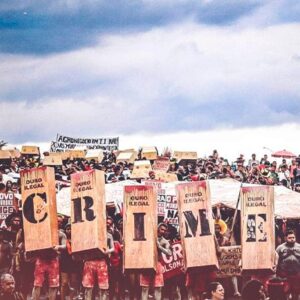On 4 April 2022, thousands of Indigenous People from various communities across the current Brazilian territory came to the federal capital, Brasilia, to set up the 18th Free Land Camp (Terra Livre) by the Articulation of Indigenous Peoples of Brazil (APIB) [1]. This mobilisation is still based on the original struggles as when it started in 2004: the right to land, the right to ethnic-cultural identity, and the right to self-determination.
With a predominantly far-right wing Parliament and with former military officer Jair Bolsonaro as President, the onslaught against Indigenous Peoples was not long in coming. In addition to hate speeches and targeted attacks on people, the anti-indigenous onslaught also manifested in several parliamentary initiatives, which the communities at the Terra Livre Camp were resisting.
An ancestral voice of our own
The coordinator of APIB, Paulino Montejo, explained to Real World Radio: “When we talk about bringing the people into politics, or bringing politics to the people, we are saying that in addition to collective social struggle we need to reclaim institutional spaces,” making reference to the camp’s slogan this year: “Taking back Brazil: delimiting territories and bringing communities into politics.”
Montejo believes that having a voice of one’s own is essential, and this was made clear ever since Joenia Wapichana, the first indigenous woman to be elected to the House of Representatives in Brazil, came to office in 2019. According to the coordinator, Wapichana has been making a huge contribution to indigenous struggles.
There are many bills proposed that go against the lands, resources and lives of native peoples. “It is obvious that their only goal is to take away the rights enshrined in the 1988 Constitution and put territories at the disposal of the predatory development model,” said Montejo.
“I could name 800 such bills, as well as proposals to reform the Constitution, legislative decrees, and all type of initiatives to take away rights,” he stated. The Indigenous Peoples at the Camp have been focusing on two particular bills which are currently under discussion: PL 191, which would enable mining exploration in indigenous territories by taking the exclusive use of these lands away from native peoples, and PL 490, which directly affects indigenous land delimitation and includes the Time Frame loophole [2]. This loophole is also under discussion within the High Federal Court.
One of the main goals of the Camp is to put pressure on the National Congress and the High Federal Court to vote against the so-called “destruction package” which includes these and so many other bills which will have a huge impact on the lives of Indigenous Peoples.
The consequences will not only be felt by Indigenous People, but by all of us, because Indigenous Peoples and local communities are important guardians of nature. They inhabit 35% of Latin America’s forested areas, they preserve 80% of global biodiversity with their traditional and community-based management methods, and they preserve 80% of the Amazon Basin, according to a report by the UN Food and Agriculture Organization (FAO) [3].
Photo: Rodrigo Duarte.
Many mobilisations took place during the first week of the Camp. On Saturday 9 April, Indigenous People joined the demonstrations that took place all over the country under the slogan: “Fora Bolsonaro” (“Bolsonaro Out”).
The current Brazilian president, who has reached his final year in office, is named by APIB as one of their greatest enemies, since he is “responsible for accelerating the project of genocide of Indigenous Peoples.”
“Your weapons may attack our bodies, but they won’t silence our cries and our chanting! We have been resisting several genocides for 522 years and now we are demanding an end to Bolsonaro’s genocidal government,” stressed APIB through social media.
Photo: Jhony Angelo Terena.
The work carried out on Friday 8 April focused on women, with a first plenary session entitled “Taking Back Brazil: the diverse voices of the first Brazilian women,” where people debated about political spaces and indigenous women. This issue is directly linked with this year’s slogan: “bringing politics to the people”, one of the central themes of the two weeks of mobilisation.
“Today, women are present in many spaces of participation, of social control, in universities, in professional careers, as women Chiefs and as members of Parliament. Today we can participate and build a Brazil where all of us can participate. We are many and we are diverse. We are here on behalf of those who came before us and those who will follow,” said the Executive Coordinator of APIB Sônia Guajajara, in this article published on APIB’s website. [4] She highlighted: “the struggle for rights is not about asking favours, because rights are not thanked, they are enforced.
Photo: Coiab Amazonia.
Photo: Coiab Amazonia.
On Wednesday 6 April, the Terra Livre Camp marched towards the National Congress, in defence of the demarcation of indigenous territories, under the slogan “Demarcation Now”. During this week of activities and actions, several issues have been discussed: the lives of isolated and recently contacted Indigenous Peoples, the Indigenous system of production and economy, the present and future of indigenous health, indigenous defence, among others.
In addition, for the first time in 18 years, the Terra Livre Camp held discussions about LGBTIQ+ matters. On Monday 11 April there was a plenary of indigenous youth in the morning, and a debate on sexuality and gender identity from an indigenous perspective during the afternoon. At the end of the day, Indigenous People marched towards the Mining and Energy Ministry to say NO to mining and to reject PL 191. One of the slogans was: “The gold you use is tainted with indigenous blood!”
Photo: Juliana Pesqueira.
Photo: Andre Cohnehtyhc Guajajara.
The Camp demanded a “truly democratic, plural Brazil, which respects diversity and the rights of everyone, regardless of their class or ethnicity. We are not only defending the rights of Indigenous People, but the rights of all people who are exploited, oppressed and discriminated against in this country,” highlighted Paulino Montejo.
Photo: Alass Derivas.
